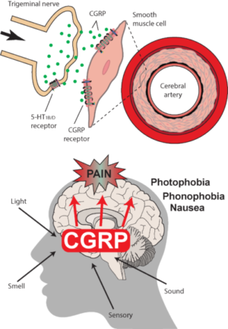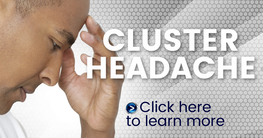|
Vertical Divider
Abortive Medications to treat migraine are designed to abort or stop an attack, hopefully, within 30-60 minutes. There are several medications that can be used from over the counter preparations to prescription medications:
|
For those migraneurs who are considered “high frequency” Episodic (8-14 days per month) or Chronic (more than 14 days per month), a preventive medication may help to decrease frequency and duration of migraines and limit use of abortive medications which can lead to medication overuse headaches. There are several categories of medications that have been shown to be beneficial in the prevention of migraine:
The first preventive medication dedicated to treating migraine.
These are the newest preventive medicines specifically developed and licensed for the treatment of migraine. Most of the current preventive medicines used to treat migraine have been developed for other conditions. This is therefore an exciting development for migraine sufferers. |
|
CGRP pathway monoclonal antibodies
How they work Migraine is a brain disorder. During a migraine attack the cerebral nerves and blood vessels release substances including Calcitonin Gene-Related Peptide (CGRP). CGRP is a neuropeptide and has been implicated in different pain processes, including migraine. CGRP also functions as a vasodilator — that is, it relaxes blood vessels. Research suggests that these substances are released during a migraine attack and play a significant role in developing and sustaining migraine. |
CGRP compounds |
AIMOVIG Erenumab (Novartis/Amgen) |
AJOVY Fremanezumab (Teva) |
EMGALITY Galcanezumab (Eli Lilly) |
VYEPTI Eptinezumab (Lundbeck) |
FDA Approval |
Episodic and Chronic Migraine |
Episodic and Chronic Migraine |
Episodic and Chronic Migraine Episodic Cluster Headache |
Episodic and Chronic Migraine |
How it is administered |
Subcutaneous injection once per month |
Subcutaneous injection once per month or every three months |
Subcutaneous injection once per month |
Intravenous infusion once every three months |
These four new compounds have been developed to either inactivate the CGRP molecule by binding to it or to block its receptor, to prevent migraine developing. Recent research conducted in thousands of people with migraine has demonstrated that these compounds are safe and effective in reducing migraine attacks and headache days.
None of the compounds are to be taken by mouth. This has the advantage of bypassing the gut, with possibly fewer side effects and the convenience of treating monthly or less. Three of these compounds are designed to be given by subcutaneous injection (just under the skin), once per month. The fourth, Eptinezumab is given intravenously (into a vein by infusion), once every three months. The main side effects noted in the studies were associated injection site reactions.
None of the compounds are to be taken by mouth. This has the advantage of bypassing the gut, with possibly fewer side effects and the convenience of treating monthly or less. Three of these compounds are designed to be given by subcutaneous injection (just under the skin), once per month. The fourth, Eptinezumab is given intravenously (into a vein by infusion), once every three months. The main side effects noted in the studies were associated injection site reactions.

















